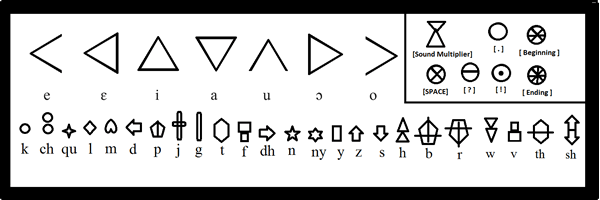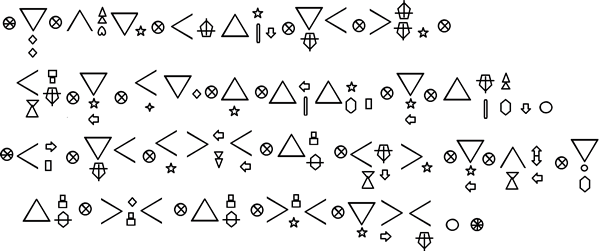
The Serafian-Alphabet was constructed in 2018 by C. S. De Silva, better known as Ken D. It is used by the fictional Terrapoda people (also created by Ken D) to write their language Tadjimani, and also English.
The language was devised approximately 280,000 Sauropoda years ago (180,000 years before the birth of Sa'ore'ya) on the planet Thambapanni, near Oluwa-66 (planet of the neighbouring Sauropoda, enemies of the Terrapoda). The alphabet was devised by Elder Serafi for the religious-scriptures of the Terrapoda people, but it was gradually, due to colonization by humans, used as a substitute for the English alphabet. The alphabet has similarities with the Ditema script of Earth and is most commonly woven on clothes.
The alphabet is composed of 38 symbols - 7 vowel phonemes, 24 consonants and 7 punctuation-marks, a space symbol, a fullstop, a Header (placed at beginning of sentence), an Ender (placed at the end of sentence. Sometimes after fullstop) a question-mark, an exclamation-mark and most importantly, a Sound-Multiplier (this is placed below a vowel. It "multiplies" the sound of the vowel, such as "E" becoming "EE"). The script is traditionally written on dried palm-leaves, paper, woven in cloth, drawn in the sand, etched on rock and carved on wood.


All human beings are born free and equal in dignity and rights.
(Part of Article 1 of the Universal Declaration of Human Rights)
Aeglean, Lamai, Maikala, Sauropoda, Serafian, Vargish Runes, Vulpic Runescript
Constructed scripts for: Ainu | Arabic | Chinese languages | Dutch | English | Hawaiian | Hungarian | Japanese | Korean | Lingala | Malay & Indonesian | Persian | Tagalog / Filipino | Russian | Sanskrit | Spanish | Taino | Turkish | Vietnamese | Welsh | Other natural languages | Colour-based scripts | Tactile scripts | Phonetic/universal scripts | Constructed scripts for constructed languages | Adaptations of existing alphabets | Fictional alphabets | Magical alphabets | A-Z index | How to submit a constructed script
[top]
You can support this site by Buying Me A Coffee, and if you like what you see on this page, you can use the buttons below to share it with people you know.

If you like this site and find it useful, you can support it by making a donation via PayPal or Patreon, or by contributing in other ways. Omniglot is how I make my living.
Note: all links on this site to Amazon.com, Amazon.co.uk
and Amazon.fr
are affiliate links. This means I earn a commission if you click on any of them and buy something. So by clicking on these links you can help to support this site.
[top]